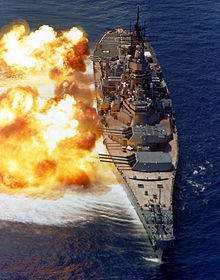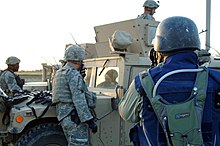Wikipedia:Wikipedia Signpost/2011-11-28/WikiProject report
The Signpost scoops The Bugle



This week, The Signpost tried to dig up some dirt on the other big newspaper in town, The Bugle. Circulated monthly since March 2006 as the official newsletter for the enormous community at WikiProject Military History, The Bugle is one of the few long-running, continuously published newsletters devoted to a WikiProject. Kirill Lokshin inaugurated the publication with a simple one-page list of the project's newest peer reviews, collaborations, and task forces. New writers and editors have brought changes to the publication's design over the years and expanded its content. Today, the newsletter delivers project news, summaries of featured content, book reviews, and opinion pieces to over 1,200 editors, including Wikipedians who are not members of the project. We interviewed Buggie111, Ian Rose, Nick-D, and The ed17.
How long have you been writing for the Bugle? Is there a particular section of the newsletter to which you most frequently contribute? Are you involved in the editing and publishing process?
- Ian Rose One way or another I think I've contributed to every part of the Bugle. Mostly it's reporting on the project's monthly writing contest and doing article news, i.e. writing blurbs for the articles that have passed A-Class Review and FAC. Last month I wrote my first op-ed piece, kicking off a set of reminiscences of September 11, and this month I contributed my first book review and guest edited the issue as a whole, which included the opening 'from the editors' piece.
- Buggie111 I've been focusing on the editorials, and have written two of them.
- Nick-D I've contributed book reviews for the last four editions of the Bugle and intend to keep doing so due to the good reception the reviews have received. I also wrote an editorial for one edition of the Bugle last year.
- The ed17: I've been involved on-and-off since early 2010 and became one of two editors of the newsletter when the project created the positions in November 2010. Cam was the other editor, but as he has been on a de facto wikibreak for school, he stepped down a few days ago. Ian Rose has taken over for him. I've done every part of the newsletter at various times except for book reviews.
The Bugle is one of the oldest continuously published newsletters on Wikipedia. What has kept it going so long? Do you have any tips for other projects that publish newsletters?
- Ian Rose Three things spring to mind that help explain the longevity: 1) commitment, i.e. it's always there and pretty professional-looking; 2) evolution, i.e. the format hasn't been stuck in a rut; 3) accessibility, i.e. pretty well anyone can contribute to it in some way. I guess those three thoughts would also constitute my advice to other projects for a newsletter.
- Nick-D I agree with Ian's comments. The point about the benefits of the Bugle evolving over time is a particularly good one. I'd also add that as the newsletter is focused on reporting significant developments to articles and publishing editorials in which editors discuss approaches to writing and research it's never really short of material and is automatically focused on topics members of the project find interesting. There's never any Wikipolitics or reports on other kinds of Wiki-dramas, for instance.
- The ed17: Commitment is huge. People like Ian, Nick, and AustralianRupert have volunteered a lot of their on-wiki time over the last two years to finish sections, write book reviews, and copy in article blurbs. Before that, we had Roger Davies, Kirill Lokshin, and TomStar81. Without these editors, our newsletter would be nowhere near what it is today.
Give us an estimate of the Bugle's circulation and readership. Is there anything in the newsletter that might interest Wikipedians who are not members of WikiProject Military History?
- Ian Rose Well I think every project member receives it unless they opt out. As to interest for non-MilHist people, I guess op-ed pieces are the most accessible, as they focus on Wikipedia-wide issues as well as aspects of the project.
- Nick-D As Ian notes, the op-ed articles are likely to be of interest to people outside the project. As the project also produces a lot of FAs, editors might also be interested in the reports on articles which have been promoted to A class through the project's A class reviews. They can see how these assessments are conducted and some of the articles which will be nominated for FA class in the future.
- The ed17: The Bugle goes out to about 1,200 editors, although a significant portion of them are inactive. Nearly all are members of the project; only 23 other editors have signed up to receive it. As Ian Rose says, the op-eds would probably be the most interesting pieces for outside Wikipedians, but there are specific interests others can watch for. For example, editors could keep an eye on our "Project news" page and implement some of the improvements we are making in their own WikiProject.
Please describe the organization and planning behind the Bugle. How do you attract new writers? Has there been a struggle to meet deadlines?
- The ed17: We have two editors, Ian and I, and one of us decides when the newsletter is ready to be published. We currently use a relatively stable four-page format that includes project news, article news, book reviews, and an op-ed. The project news holds all of the new developments in the project over the last month, award recipients, and the contest results, while the article news shows the month's new FA and A-class articles. We typically run two book reviews a month. Op-eds are explained below.
- Writers normally come to us, as they are interested in a certain topic and want to bring that to a wider audience. If an editor has something tangentially related to military history or would be of interest to our readers, they write something and we put it in an op-ed. If it'll be a recurring series, we create a new section for it. We haven't had to reject any submissions yet, but we have had a few times where we had no new op-eds. When this happens, we solicit an op-ed from someone who is an expert in something relevant to the project, like Moonriddengirl's two-part essay on copyright in August and September 2010, Fifelfoo's thoughts on plagiarism in June 2011, or WereSpeilChequers' op-ed on the request for adminship process in July 2011.
The newsletter has changed its format a few times over the years. Why was the current layout chosen?
- The ed17: We made many tweaks for the January 2009 issue (before, after), but there were two major changes in 2010. The first was in June 2010 (before, after), where we moved to a Signpost-style multiple page format while trying to keep the feel of the old newsletter. The other change was in October 2010 (before, after), where we made a complete break and moved to a less-cluttered format. The newsletter today is the result of tweaks to this version. For those interested, the discussions leading to these changes are located here, here, and (October 2010) here.
In addition to news, the Bugle has run book reviews, editorials, and op-eds. What are some of the challenges of publishing opinion pieces? Do you have any tips for the Signpost, which began publishing more opinion pieces a couple months ago?
- Nick-D I suppose one suggestion would be that the opinions be on topics closely related to developing articles as this is the main thing that most readers are interested in. I started the book review section as a way of providing an assessment of the usefulness of some newish books in developing articles, for instance.
- The ed17: Book reviews work best when there is an explicit raison d'être – e.g. we have military history, the Signpost has Wikipedia-related books – and one or more dedicated writer(s). We have very good people who are reading and writing these reviews, and I'm very happy Nick-D (and now Ian Rose) volunteer their time to write them.
- Opinion pieces are a bit more difficult. The choice and presentation of topics will sometimes be inflammatory to a segment of readers. The editors have a duty to try to mitigate this impact and vitriol while still allowing the views to be aired, possibly by soliciting an opposing view to run in the same or next edition (similar to The New York Times' "Room for Debate"), but there's only so much they can do. For us, while military history is a relatively uncontroversial subject, you will never know when someone will raise strong objections; thankfully, the Bugle has not had to deal with this yet.
- The Signpost will have a much more difficult time, as a certain portion of the topics covered will be objectionable to one or more of Wikipedia's factions. I'm fully in favor of the Signpost's move towards designated opinion articles, as the views shared may goad the community into discussion on important issues. The cautionary note I'd sound is that opinions need to stay in the opinion section. I'll be keeping an eye on how the Signpost attempts to manage all this and the effect of the op-eds on the community. It'll be an interesting ride.
It's been a year since we dropped in on WikiProject Military History. Since you constantly monitor the project's pulse, give us a brief review of the project's biggest news stories this year.
- The ed17: Inside the Bugle itself, our biggest story was the op-ed "Remembering 9/11," which was sent to our subscribers on the anniversary of the attacks. For the project, the introduction of C-Class (more information), the closure of the review department (more information), and reaching the goal of 500 FAs in Milhist's scope were the biggest stories.
- Buggie111: We've also had a new coordinator election and the death of a contributor, bahamut0013.
- Ian Rose: This year the project achieved a target of 500 featured articles, an event that – ironically – didn't attract much attention in the Signpost, if I remember correctly...
Anyone interested in learning more about WikiProject Military History can read through the WikiProject Report's long-running coverage of this very active project. Check out our overview of the project's structure from 2007, interview with a project coordinator from 2008, update on the status of the project's initiatives from 2009, and in-depth report on Operation Majestic Titan from 2010.
For news junkies interested in discovering the newsletters of other WikiProjects, check out the newsletters mailbox. For more WikiProject news, read The Signpost's WikiProject Report each week. To share your project's news and notes with the readers of The Signpost, simply post a message at the WikiProject Desk and we'll try to include it in the news sidebar at the top of each issue.
If you're confused by the ambiguous clues we leave in the last two sentences of each WikiProject Report issue, just wait until next week! In the meantime, find what you're really looking for in the archive.



Discuss this story
As each section of The Bugle has its own page that has to be opened before it can be read, there are statistics available for how popular it is. While the distribution of The Bugle may be high, around 1,200 according to ed17, its readership seems to be significantly lower. The September edition, delivered on 27 October, received an average of 110 views to each of its pages excluding the front in the first five days of its distribution (stats for the Sep. edition: op-ed project news, article news, book reviews). I looked for a single-page edition such as The Signpost has, but was unable to find one. Nev1 (talk) 13:43, 29 November 2011 (UTC)[reply]